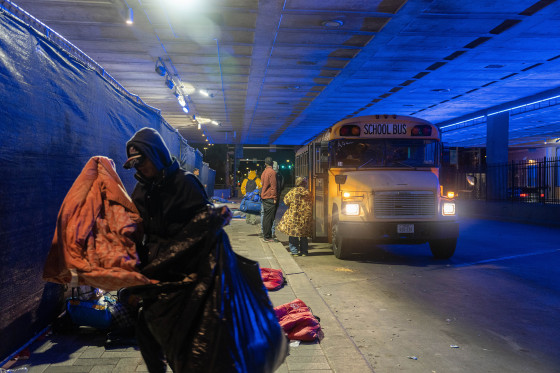
A unusual winter storm swept across parts of the southern and eastern United States on Tuesday, prompting weather experts and government agencies to issue health and power loss warnings.
The National Weather Service warned of heavy snow, freezing rain, and a major winter storm in a forecast released early Tuesday. “A bitterly cold airmass will remain in place for much of the South and eastern U.S. over the next couple of days,” the agency said.
Forecasters predicted that most places will see temperatures 20 to 30 degrees below the January average, prompting some states to declare emergencies. In certain areas of the Midwest, the temperature is expected to drop to single digits.
“Many record lows are possible Wednesday morning, especially along the Gulf Coast and into the Tennessee Valley,” according to the National Weather Service.
Officials have issued uncommon warnings, more typical of those in the north, in response to the potentially historic storm. In order to prevent pipes from freezing, people have been advised to stay away from travel and make sure their automobiles are winterized.
Additionally, officials issued warnings about “long-lasting power outages” and ice buildup that might bring down power lines and trees. In south and southeast Texas, a transmission emergency notice was issued by the Electric Reliability Council of Texas.
In the Gulf Coast region, where severe winter weather is uncommon, a low pressure system and Arctic air could produce a “historic snowfall,” according to the weather service.
Houston and New Orleans could see up to six inches of snowfall, while Georgia, the Carolinas, and northern Florida might see a mix of freezing rain, sleet, and snow further east. Up to four inches of snow might fall in certain areas of southwestern Georgia and Alabama.
According to the NWS, storms may cause flight cancellations and “major highway and air traffic disruptions, including possible road closures” that could extend for several days. “Cover exposed skin to reduce your risk of frostbite or hypothermia,” the NWS advised.
According to a weather service post on X, sleet and snow showers have already formed throughout Houston. On Tuesday, temperatures north of the Houston Metro dropped as low as 25 degrees.
At midnight on Tuesday, flight operations were paused at Houston’s two main airports, Hobby Airport and George Bush Intercontinental Airport. As of early Tuesday, roughly 400 fights were delayed and over 1,800 were canceled in the United States, according to flight-tracking website FlightAware.
Governor Jeff Landry of Louisiana cautioned residents against going outside after he proclaimed an emergency in his state on Saturday.
At a press conference on Monday, he stated that staying off the road is crucial. Remain warm at home unless you have an urgent need to travel.
As officials prepare a strategy for potential road closures, Louisiana’s transport department reported that the state had amassed 400,000 pounds of salt that it may assist in spreading across motorways if necessary to remove the snow and ice.
The governors of Alabama, Georgia, Florida, and Mississippi have also proclaimed emergencies.
The Midwest has also been under a blanket of cold weather warnings; in regions of Kansas, Colorado, and Nebraska, the NWS has issued a “extreme cold weather warning” with temperatures as low as 30 degrees below zero.
Parts of the northeast, including New York, where temperatures could drop as low as 25 degrees, are also predicted to see similar conditions.
In certain areas of the Rockies, the northern Plains, and the Upper Midwest, wind chill may also make temperatures to feel like minus 55 degrees. Missouri, Texas, Louisiana, and Alabama may even establish chilly records.
“Dangerously cold wind chills as low as 25 below zero could cause frostbite on exposed skin in as little as 30 minutes,” the National Weather Service warned.
